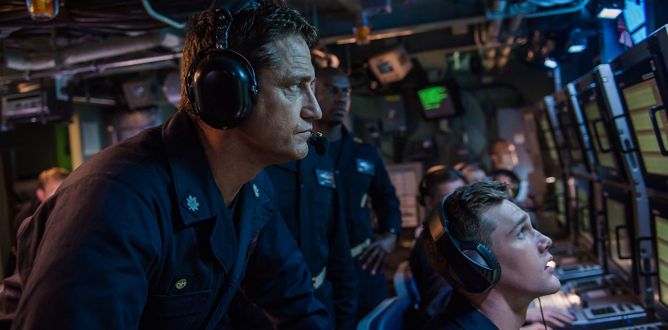Hunter Killer Parent Guide
The plot is simple and the special effects are uneven, but between the gripping undersea battles and the politics in the Pentagon, there's always something to grab your attention.
Parent Movie Review
When an American submarine in the Barents Sea goes missing, presumed destroyed, the Chairman of the Joint Chiefs of Staff, Charles Donnegan (Gary Oldman) and Rear Admiral John Fisk (Common) dispatch the submarine USS Arkansas to discover why. When it arrives on the scene, Commander Joe Glass (Gerard Butler) finds that the missing sub was torpedoed, and a nearby sunken Russian boat has been blown apart from the inside. Immediately thereafter, the Arkansas is fired on by a second Russian vessel. Will Commander Glass start a war as he protects his crew? Or is there a bigger picture unfolding above the waves?
If you think this story sounds familiar, you are correct. But if you are expecting the same level of intrigue and spycraft as The Hunt for Red October, you will be disappointed. The plot is much simpler, and quite straightforward. To balance this, Hunter Killer takes the audience through one intense scene of sub-aquatic action after another, from a tense torpedo battle under the icebergs to silently navigating a mined inlet. Commander Glass’s use of very creative military tactics ensures that these scenes remain interesting even when they are visually somewhat repetitious.
The big surprise for me in this film comes from the special effects which are of very uneven quality. Sometimes, especially towards the middle and end of the film, they’re just fine. But the opening scene looks like it was rendered in 1982 on a Commodore 64 and a seven-dollar budget. A submarine cruises right past the camera, in a lingering shot that would really highlight competent effects work: what you get instead is a textureless gray tube scooching awkwardly through the water. It’s a shame, because submarines are generally well depicted in the rest of the film.
This isn’t a movie for young children, as the R rating and moments of extreme peril would indicate. However, due to the almost total lack of sexual content and alcohol or drug use, this may be a good film for older teens with an interest in military or espionage thrillers. The violence is frequent but not nearly as graphic as found in many films in the same genre. Profanity is a major issue in this picture, with four sexual expletives and another 18 curse words – but again, this is still lower than other similar movies.
Even though it’s a little difficult to justify a two-hour run time for a film with such a simple premise, it’s a fun ride, and you won’t be bored for most of it. From the gripping sub chases and fights, to an unsanctioned military action in foreign territory, to the political maneuvering in the Pentagon, there’s always something happening to keep your attention firmly on the screen. If submarine movies are your kind of thing, make sure to set a course for this one. Just watch out for some poorly rendered torpedoes.
Directed by Donovan Marsh. Starring Adam James, Gerard Butler, and Gary Oldman. Running time: 121 minutes. Theatrical release October 26, 2018. Updated January 30, 2019Watch the trailer for Hunter Killer
Hunter Killer
Rating & Content Info
Why is Hunter Killer rated R? Hunter Killer is rated R by the MPAA for violence and some language
Violence: Multiple individuals are shot, including blood spraying from the wound. Several individuals are executed and dumped in the sea. A man is killed when a door explodes into him. A dying man pulls the pin on several grenades he is holding to kill the people approaching him. Two individuals are stabbed in the dark.
Sexual Content: Brief mention of “a hot piece of a**”, but with no detail beyond that. All characters are fully clothed at all times.
Profanity: Frequent use of mild and moderate language, as well as terms of deity. Four uses of extreme profanity.
Alcohol / Drug Use: A single instance of a character smoking.
Page last updated January 30, 2019
Hunter Killer Parents' Guide
How do we respond to situations in which other’s motivations are unclear? How do we put aside preconceptions when dealing with people or groups with whom we have a history of conflict?
Are there situations in which the violent overthrow of a government is appropriate? Many countries have a history of revolution (violent or otherwise) - the United States was founded after a rebellion against Great Britain, the People’s Republic of China resulted from a Communist revolution against a corrupt monarchy, Colombia gained limited and then full independence after street protests and riots, India gained independence after Mahatma Gandhi led non-violent demonstrations and a campaign of civil disobedience against the British Raj. Do you think these revolts were all justified? Why or why not?

